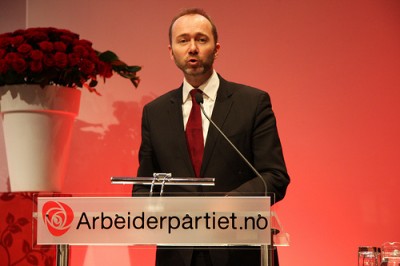Trade Minister Trond Giske faced the disciplinary committee of the Norwegian Parliament this week after accusations that he pressured the boards of state-controlled firms into appointing personal and political allies to top positions. Giske was criticized for meddling in normal processes, but claimed himself that opposition politicians’ “camaraderie theory” had no basis in reality.

Giske and fellow Labour Party politicians claim the charges against him, and the parliamentary hearing itself, are the result of political power plays, while opposition politicians accuse him of abuse of power.
Giske has been at the center of conflicts involving such major Norwegian firms as Telenor, Entra Eiendom and Kongsberg Gruppen during the past year, before finally being called by the parliament’s Kontroll- og konstitusjonskomité, which handles disciplinary issues.
As the government minister in charge of business and trade, Giske has the power to make board appointments and exert some influence. Giske has denied any wrongdoing or attempts to place close friends in high-ranking jobs.
“There are no close friends of mine in a single company board under the Trade Ministry. The “camaraderie” (friendship) theory is lacking its most important element; the friend,” Giske said during Wednesday’s hearing.
Representatives of some of the companies involved said Giske interfered very late in hiring or appointment processes, therefore complicating it, but denied they felt pressured into making certain decisions.
‘Unprofessional’
It was confirmed during the hearing, though, that Giske proposed his good friend Tore Sandvik for a position on the board of telecommunications group Telenor. Giske has been accused of putting pressure on the board to hire his friend, but Sandvik was not considered to be qualified for the position. Board members also believed ties between Giske and the candidate were too tight.
The former head of Telenor’s committee that nominates shareholders’ representatives to the corporate assembly and board said the biggest problem was that the state brought its candidate to the table after their own list of candidates was ready, pushing forward their own deadlines and tampering with normal procedures. The nominations committee started its work in the autumn of 2010, but it was not until March 2011 that the Trade Minister brought his candidate to the table.

The committee felt Giske, as representative for the state as controlling shareholder in Telenor, was within its rights to present candidates for such a position. “The state has, like any other owner, the right to suggest candidates,” committee member Jan Erik Korsøen said during the hearing. “We interviewed this candidate and found he was not fully qualified to push out our other candidates.”
Giske denied in October that he had put forward a demand. “If we wanted it, it would have happened,” Giske told TV2 at the time. “The state holds 54 percent of the stock in Telenor. This was a unanimous election in the nomination committee. We have never put forward a demand about the composition of the Telenor-board.”
Anders Anundsen, head of the disciplinary committee that called in Giske, nonetheless called Giske’s behavior “unprofessional” and said he put Telenor’s nominations committee in a tough situation. “When the largest owner says it’s not pleased with what it’s done after six months of hard work, it is hard to look at this as anything else than pressure (from the trade ministry),” Anundsen told NRK. “The state holds all the power, which is why it is important that it exercise this power correctly.”
Conflict continues in Kongsberg Gruppen
Giske has also been accused of putting pressure on the board of Norwegian company Kongsberg Gruppen to appoint the head of The Norwegian Confederation of Trade Unions (LO), Roar Flåthen, for a position on its board. LO is formally a bipartisan organisation with members supporting all parties, but has traditionally been closely linked to Giske’s ruling Labour Party.
Sverre Valvik, head of the elections committee at Kongsberg Gruppen, said at the hearing that it was unusual for an owner to launch such a process, but denied feeling any kind of pressure. Also in this case, Giske’s approach involving Flåthen came in late.
“I do not perceive this process to be completely tidy considering the timing of this suggestion,” Valvik said. “Other than that, I have nothing to criticize.”
The board of Kongsberg Gruppen had no plans to hire a new board member at the time, and refused to kick out a current member to give Giske’s candidate a seat. As a compromise, Flåthen was given a new position as a deputy member, which meant that he can be present on meetings but without voting rights.
Entra Eiendom saga
The third major alleged conflict of interest involving Giske that has rolled out this year involved Entra Eiendom, the company in charge of the state’s commercial real estate. Details of the process in hiring Giske’s friend, Rune Olsø, as Entra’s chief executive surfaced during the hearing.
Olsø had been appointed Entra Eiendom’s new CEO earlier this year but debate over Olsø’s position took off after reports that his annual salary would reach NOK 4 million, much higher than comparable jobs. It later surfaced that both Entra’s chairman and deputy chairman were opposed to hiring Olsø, and the conflict ended with Entra’s board being replaced and Olsø resigning from the job. Giske at that point had been removed from the process and the “Entra clean-up” was handled by another government minister from another political party.
Entra’s former board chairman Grace Reksten Skaugen, who resigned after what she called an attempted “coup” by other board members to get Olsø hired as CEO, said she contacted the Trade Ministry after a particularly tumultuous board meeting in May at which members tried to push through Olsø’s hiring. Reksten Skaugen objected to a slim majority of board members’ efforts to urgently hire a new CEO with no alternative candidates and with no normal procedures for such an appointment, such as giving the board time to evaluate and prepare a response.
To top the conflict, Reksten Skaugen also accused Olsø of tampering with the official protocol from the May board meeting, since it made no mention of the board’s discussion of the matter.
A political fight
Martin Kolberg, one of Giske’s fellow Labour politicians on the parliamentary committee, repeated his complaints that the committee itself was abusing its role. He said the Parliament should not interfere with internal processes in listed companies, claiming it could harm their integrity.
The committee, led by politicians from the opposition Progress and Conservative parties, has also been accused of turning the hearing into “a political power play,” aimed only at harming the beleaguered left-center coalition government.
Giske himself has earlier said he has “powerful opponents,” noting the extensive media coverage and that “someone” wants to prevent the government from placing board members in state-owned companies.
Views and News from Norway/Aasa Christine Stoltz
Please support our news service. Readers in Norway can use our donor account. Our international readers can click on our “Donate” button:

